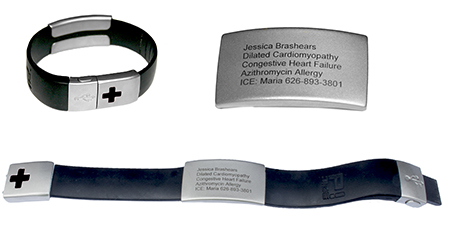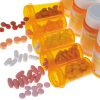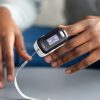- Empty cart.
- Continue Shopping
The Role of Medical IDs in Medication Safety

In the realm of healthcare, effective communication is paramount. This is particularly true when it comes to medication management. Medical IDs, often overlooked, play a crucial role in conveying vital information about an individual’s medical condition and prescribed medications.
The Critical Importance of Medication Safety
Safe and accurate medication management is vital for individuals with chronic conditions, allergies, or specific health needs. Misunderstandings or omissions in medication regimens can lead to serious health complications or even life-threatening situations. Thus, providing clear and accessible information about an individual’s medications is of paramount importance.
The Role of Medical IDs: A Silent Guardian
1. Instant Access to Critical Information:
In emergencies, time is of the essence. Medical IDs, often worn as bracelets or necklaces, provide instant access to crucial medical information. This includes details about allergies, chronic conditions, and, most importantly, a list of current medications.
2. Avoiding Adverse Reactions:
Certain medications may have contraindications with other drugs or conditions. A medical ID can alert healthcare providers to potential interactions, helping them make informed decisions about treatment options.
3. Ensuring Accurate Dosage and Administration:
In situations where an individual may be unconscious or unable to communicate, medical IDs help healthcare professionals administer the correct dosage of medications, avoiding potential overmedication or underdosing.
4. Empowering the Patient:
Medical IDs serve as a tangible reminder for individuals to take their medications as prescribed. This visual cue reinforces adherence to the prescribed regimen, which is critical for managing chronic conditions effectively.
Key Information to Include on a Medical ID
- Name and Emergency Contact Information:
- Full name
- Emergency contact name and phone number
- Medical Conditions:
- Chronic illnesses or conditions (e.g., diabetes, epilepsy)
- Allergies (e.g., drug allergies, food allergies)
- Current Medications:
- Name of the medication
- Dosage and frequency
- Route of administration (e.g., oral, injectable)
- Implants or Devices:
- Mention if there are any medical devices or implants (e.g., pacemaker, insulin pump)
- Blood Type:
- Especially important in emergency situations where blood transfusions may be necessary
Types of Medical IDs
- Bracelets or Necklaces:
- These are the most common types of medical IDs. They can be customized with engraved or printed information.
- Wallet Cards:
- These are small cards that can be carried in a wallet or purse. They contain essential medical information.
- Digital Medical IDs:
- Some smartphones have built-in features for storing medical information that can be accessed even when the phone is locked.
- Smart Jewelry:
- Technological advances have led to the development of stylish jewelry with integrated medical ID features.
Ensuring Effectiveness of a Medical ID
- Keep Information Updated:
- Regularly review and update the information on the medical ID to reflect any changes in medications or medical conditions.
- Wear It Consistently:
- Make it a habit to wear the medical ID at all times, as emergencies can occur unexpectedly.
- Inform Caregivers and Healthcare Providers:
- Ensure that family members, caregivers, and healthcare providers are aware of the existence of the medical ID and its significance.
- Consider Cultural or Religious Preferences:
- Choose a medical ID style that aligns with personal preferences and cultural or religious beliefs.
Conclusion: A Lifesaving Identifier
A medical ID is a silent but powerful guardian of one’s health, particularly in the realm of medication safety. By providing instant access to critical medical information, it empowers both individuals and healthcare professionals to make informed decisions, especially in emergency situations. Wearing a medical ID is not just a precaution; it is a proactive step towards ensuring one’s well-being. So, let your medical ID be your voice when words may fail, and let it stand as a symbol of your commitment to medication safety and overall health.








